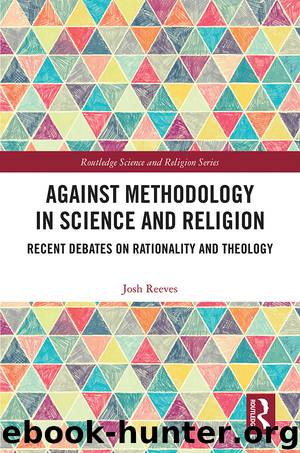Against Methodology in Science and Religion by Josh Reeves

Author:Josh Reeves
Language: eng
Format: epub
Publisher: Taylor & Francis (CAM)
Published: 2018-02-27T16:00:00+00:00
Conclusion
Like the Lakatosian project of Nancey Murphy, McGrath’s project is a prominent example of a Christian theologian looking to science to show the legitimacy of theology. For McGrath, science’s ability to accurately map the world independent of the human mind gives support for the ability of theology to do so as well. Just as the sciences respond to reality, theology is a “deliberate and principled attempt to give a faithful and adequate account of the way things are, subject to the limits placed upon human knowledge on account of our status as sinful creatures, and our location in history.”75 Because it is the world that should determine how best to study it, the approaches and methodologies used will vary from discipline to discipline. McGrath’s position, which tries to account both for the progress and limitations of human knowledge, is called “critical realism,” and it is shared by scholars from across the natural and social sciences and humanities.
The central problem of McGrath’s Scientific Theology is that even if one grants the success of scientific realism, it has little bearing on the status of theological realism. There are strong reasons for asserting realism in the sciences regarding particular scientific theories, but our epistemic confidence in realism should vary according to the reasons internal to the research program. From the perspective of local realism, the accuracy of a realist interpretation in one domain has no bearing on the accuracy of a theory in a separate domain. Theological realism is thus neither helped nor hindered by the realism of the sciences. Judgments about the scientific nature of theology will depend almost entirely on arguments offered on behalf of a particular theory. From a theological perspective, the real issue is whether the unobserved entities postulated by Christian theology are real. To say theologians are engaging “reality,” as McGrath repeats throughout the three volumes, is far too vague to be of use and provides when arguing for the truth of Christian theological claims.
Download
This site does not store any files on its server. We only index and link to content provided by other sites. Please contact the content providers to delete copyright contents if any and email us, we'll remove relevant links or contents immediately.
The Lost Art of Listening by Michael P. Nichols(7494)
Why I Am Not A Calvinist by Dr. Peter S. Ruckman(4149)
The Rosicrucians by Christopher McIntosh(3513)
Wicca: a guide for the solitary practitioner by Scott Cunningham(3167)
Signature in the Cell: DNA and the Evidence for Intelligent Design by Stephen C. Meyer(3132)
Real Sex by Lauren F. Winner(3016)
The Holy Spirit by Billy Graham(2944)
To Light a Sacred Flame by Silver RavenWolf(2814)
The End of Faith by Sam Harris(2733)
The Gnostic Gospels by Pagels Elaine(2527)
Waking Up by Sam Harris(2454)
Nine Parts of Desire by Geraldine Brooks(2361)
Jesus by Paul Johnson(2352)
Devil, The by Almond Philip C(2325)
The God delusion by Richard Dawkins(2305)
Heavens on Earth by Michael Shermer(2278)
Kundalini by Gopi Krishna(2180)
Chosen by God by R. C. Sproul(2161)
The Nature of Consciousness by Rupert Spira(2104)
